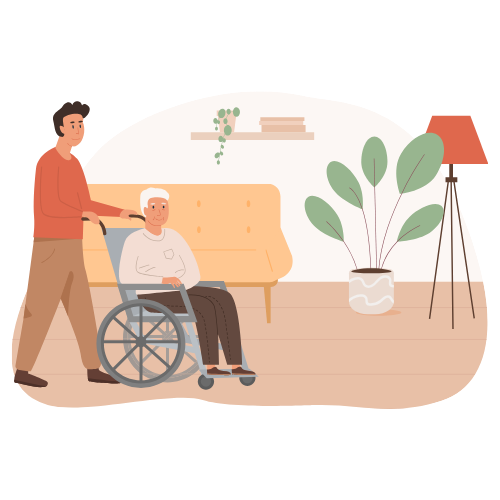Unpaid carers
What the evidence shows
Unpaid carers provide essential support for loved ones who are approaching the end of their life. Although they may not always feel knowledgeable about the dying process or be aware of the realities of caring for a dying person, unpaid carers often take on the role of unofficial coordinator of care to help communication and collaboration between professionals.
A general preference for dying at home presents challenges to the caregiver, who must balance emotional turmoil with practicalities associated with providing daily care. Carers may have to give up work, or reduce their hours, causing additional financial pressures, or they may not have the option of refusing paid work to carry out these caring responsibilities. It is much more difficult to die at home without carer support. Even with carer support, people may choose to die in hospital rather than at home to reduce the burden on their caregiver.
Evidence shows that people in more affluent areas are more likely to have flexibility around working and are more able to afford to pay for a professional carer. They also have a better understanding of the workings of the health and care system to advocate for the care of their loved ones.
It is suggested that the cost to unpaid carers should be considered alongside acute and other care costs, and costs should not be shifted to already burdened carers. Community networks have an important role to play in supporting unpaid carers.
When a dying person isn't able to communicate directly with services, responsibility for sharing information may fall on the carer, which can have implications for the carer's wellbeing and the patient's right to make their own decisions. LGBTQ+ carers sometimes face the distress of not being recognised as the primary carer of their loved one.
Carers may also have health issues of their own, and those in receipt of care may experience an abrupt change in their support and living arrangements following the death of their primary carer.
What Kirklees organisations told us
Many of the above points were mentioned in discussions with local organisations. The following issues were also raised.
Care specific issues
- The need for guidance for carers on referral pathways and the availability of funding and support, depending on the person's situation; this may include a simpler way of categorising people depending on the amount of time they are estimated to have left to live.
- The importance of caring for carers, and not removing carer support networks as soon as the cared-for person dies. Caring takes its toll on the carer's health.
- Understanding that not all carers are visible to the system, either because they don't identify as a carer or because the cared-for person has declined medical support. A carer's voice may not be heard if the carer does not have power of attorney.
Other issues raised by the group
- Data sharing: Care could be streamlined if it was easier to share appropriate patient information between organisations, reducing the need to repeat questions.
- Staff knowledge: Ensure staff know about end-of-life pathways, particularly at an early stage and across different health conditions; support staff to have difficult end-of-life conversations and be aware of different cultural responses to death.
- Physical infrastructure: Issues may relate to a lack of available physical resources, such as not enough single rooms in hospitals.
Examples of good practice
- An 'emergency service' team used by Carers Trust alongside The Kirkwood, providing a quick response and support to carers.
- Carers Count provide support to ex/former/after-carers, so they can still access the same support networks and give them time to adapt to their changing needs.
Recommendations
- Support carers throughout their care journey.
- Improve mechanisms for the sharing of appropriate patient details between organisations.
- Streamline physical and informational spaces to ensure carers have the right information and can access the right services and funding.
